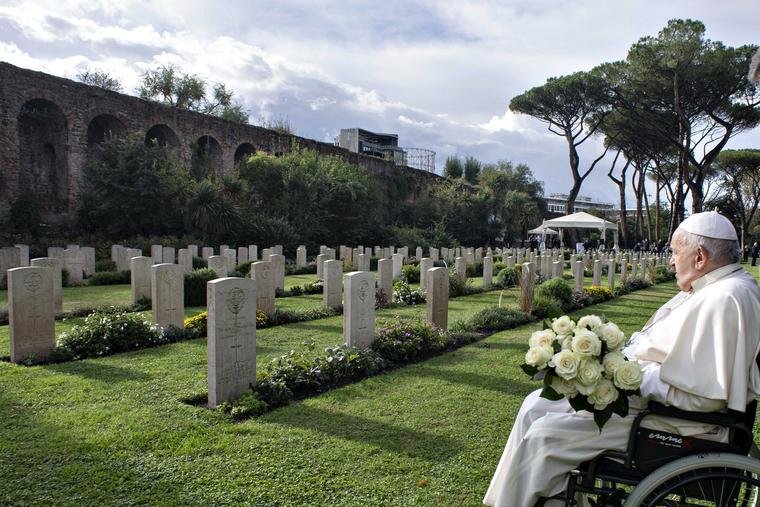Pope Francis Hasn’t Repudiated the Catholic Doctrine of Just War
National Catholic Register, 26 January 2024
Recent papal statements are best understood as a passionate appeal for an end to violence, not a rejection of the long Catholic tradition on war and peace.
Recent comments of Pope Francis that “war can never be justified” made headlines around the world. That’s not exactly what he said, though; in the context of remembering the Holocaust, the Holy Father said that the “logic of hatred and violence” can never be justified.
Nevertheless, this week’s comments are part of a pattern of strong statements against war. Some have wondered whether that means that the Holy Father has set aside the Catholic tradition on just-war teaching. That is not the case, but the question does bear examination.
The world does not want the pope to be a cheerleader for war; there are too many of those already. Rome serves as a witness to peace and its possibility, perhaps never more dramatically than in the 1963 encyclical letter of St. John XXIII, Pacem in Terris (Peace on Earth), written in the months after the Cuban Missile Crisis brought the world to the brink. While most encyclicals disappear from memory, the 60th anniversary of Pacem in Terris was widely observed last year.
In recent weeks, Pope Francis has spoken about war with increasingly urgent rhetoric. The Holy Father has referred for years to a “third world war being fought in pieces.” Two years after the full-scale Russian invasion of Ukraine, and three months into the Israel-Hamas war in Gaza, escalating wars have heightened the frequency and intensity of papal condemnation of war. The last two years have occasioned several such condemnations.
In March 2022, in a video call with Patriarch Kirill of Moscow, Pope Francis suggested that it was no longer possible to speak about “just war”: “Wars are always unjust.”
In a June 2022 interview, Pope Francis spoke about the 1944 Normandy landings, asking whether it was “justified” to send Allied soldiers against the Nazi fortifications. Going further, he suggested that it may be time to rethink whether even a “just war” should be fought.
“I believe it is time to rethink the concept of a ‘just war.’ A war may be just; there is the right to defend oneself. But we need to rethink the way that the concept is used nowadays,” Pope Francis said.
In August 2022, in a papal book entitled Against War, Pope Francis declared:
“War is not the solution, war is madness, war is a monster, war is a cancer that feeds off itself, engulfing everything! More so, war is a sacrilege that wreaks havoc on what is most precious on our earth, human life, the innocence of the little ones, the beauty of creation. Yes, war is a sacrilege!”
“Wars are always a defeat, always,” the Holy Father said last year on an All Souls’ Day visit to the military cemetery in Rome. “There is never a total victory. One side wins over the other, but behind that there is always defeat in the price that has to be paid.”
At his Angelus address 10 days ago, the Pope spoke of “war itself” as a “crime against humanity”:
“We pray that those who have power over these conflicts will reflect that war is not the way to resolve them because it sows death among civilians and destroys cities and infrastructure. In other words, war today is in itself a crime against humanity. Let’s not forget this: War itself is a crime against humanity.”
At his general audience on Jan. 24, the Holy Father said that “war itself is a denial of humanity.”
If war is a “sacrilege,” a “denial of humanity” and a “crime against humanity,” does that mean that Pope Francis is proposing pacifism, teaching that even self-defense against an aggressive power is forbidden?
No. It’s important to look elsewhere, as well.
In his 2020 encyclical Fratelli Tutti (Brothers All), the Holy Father acknowledged that a just war is possible, but that the criteria for such could be applied too loosely:
“War can easily be chosen by invoking all sorts of allegedly humanitarian, defensive or precautionary excuses, and even resorting to the manipulation of information. In recent decades, every single war has been ostensibly ‘justified.’ The Catechism of the Catholic Church speaks of the possibility of legitimate defense by means of military force, which involves demonstrating that certain ‘rigorous conditions of moral legitimacy’ have been met. Yet it is easy to fall into an overly broad interpretation of this potential right. In this way, some would also wrongly justify even ‘preventive’ attacks or acts of war that can hardly avoid entailing evils and disorders graver than the evil to be eliminated” (258).
Moreover, in the same document Pope Francis wrote of the obligation to resist an aggressor, “stripping him of power”:
“We are called to love everyone, without exception; at the same time, loving an oppressor does not mean allowing him to keep oppressing us, or letting him think that what he does is acceptable. On the contrary, true love for an oppressor means seeking ways to make him cease his oppression; it means stripping him of a power that he does not know how to use and that diminishes his own humanity and that of others. Forgiveness does not entail allowing oppressors to keep trampling on their own dignity and that of others, or letting criminals continue their wrongdoing” (241).
Continue reading at the National Catholic Register.
